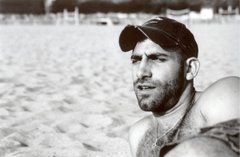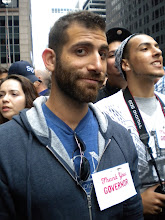Nothing really prepares you for seeing your 96 year old grandmother. My mother and I got off the elevator on the third floor of the retirement center. As soon as the automatic doors crack open and the fluorescent lights reflect off the linoleum floor the stench of old punches you in the face. The smell is sour, sticky and humid, nearly dead.
We walked past a reception area where the elderly, unmoving, almost drooling slumped over bean bags of people stared into space or seemed lost in a perpetual daze. Hanging above them was a sign that read "non-ambulatory."
My mother, having done this every other day since we moved my grandmother up from Florida last summer, was used to it. I, who had only visited my grandmother a few times, had to mentally deflect the surging thoughts of life and the inevitable approaching mortality. "Non-ambulatory" throbbed across my brow. My mother, sensing the onslaught of emotions from her sensitive son, grabbed my arm the only way a mother knows how. Delicate, soft, encouraging and lead me into a big open room with a dot-matrix printed sign above the door. "Rec Room."
The elderly all sat in circle. The wheels of their wheelchairs touching one another. Some rolled back and forth wanting a better angle around the perimeter of the circle. An overweight Hispanic woman with too much make-up and a heavy accent were encouraging the elderly to throw weighted balls on to a target on the floor. It was a game, like darts, where the elderly limp-lobed their balls on to the target gaining a score or hoping for a bulls eye. There my grandmother sat, her back to my mother and I.
"Excuse me," my mother said politely squeezing herself through the wheel chairs trying to get to my grandmother. She placed a hand on the back of my grandmother's shoulder and my grandmother turned to greet the hand with a delayed response. She placed a hand on my mother's, thankful she was there to relieve her of this game she hadn't been paying attention to anyway. My mother backed her wheelchair out of the circle in a k-turn and reminded her I was there to visit. When my grandmother's eyes met mine she smiled, dentures oddly placed, as a child would to a shiny object. She had grown older since the last time I had seen her just three months ago. A little thinner, her hair more disheveled.
"Well hello dahhhh-ling," she said as she had done so throughout my childhood. I bent down smiling to kiss her cheek and as my face met hers my heart cracked sending a surge of emotions to my eyes. My trembling lower lip the only protection against producing real tears. I cleared my thoughts while my mother and I walked her to a nearby table. We pushed her in and I sat very close.
"How are you, Gram" I asked. "Stuck in this place," she said dryly but jovial. My mother rolled her eyes. I pulled myself even closer to her because, for the last 10 years, I always went on the assumption that this might be the last time I would see her. My grandmother, too, for the last 10 years has been telling my family that she's ready to die. Her birthday is next week, March 21st so I wished her a happy 96.
"I never thought I'd live this long," she said aloud to myself and my mother but more so as a reminder to herself. Her brain is completely functional but her body is struggling to keep up. Fearing this might actually be one of the last times I see her I dug in with questions.
Born in 1914 in the Lower East Side of New York City my grandmother, Sarah Papish, was the daughter of Russian-Jewish immigrants. Growing up in a tenement on Delancey St. my grandmother was the third of four children. Two boys and two girls. Sarah at the age of 5, like many children her age, was given the responsibility of taking care of her younger sister, a job which she loved having. She went to school but states she mostly hung around and socialized within the Jewish community of the Lower East Side. "We were insular in those days. If you spoke Yiddish, you spent time with those who spoke Yiddish. We went to school together. We went to temple together."
"And how did you have fun," I asked wanting to hear something I haven't heard before hoping I'd peel back an unseen layer, a secret tidbit from within my ancestry. But it's always the same answer, "We didn't have fun like you have fun these days. We were poor. We worked. In those days girls didn't socialize with boys!"
"Yeah but Gram....Did you drink, smoke?"
"Who do you think I am?!"
My mother chuckles.
"Ok fine. Then, tell me about Grandpa." Grandpa Manny, Emanuel Lesser, the man from whom my name derives, died in the summer of 1980. One year before I was born. I never met the man and it stands as one of my mother's greatest sorrows that he was never an influence in my life.
"He was a great guy...a great, great guy," my grandmother remembers through a giant smile. Again my heart slingshots emotions to my eyes. I hold the forming tears back. It's funny how my grandmother has trouble remembering the name of her roommate in the retirement center but the memories of 70 years back are as clear and present as ever. "Oh! He was so handsome," she says reaching across the table and grabbing my mother's forearm. "You have his eyebrows and nose," my mother says to me.
"I met him at a party," my grandmother continues, "he was quite the man at the time because he had his own car. My friend Meryl introduced us and that night he offered to drive me home. He was living in New Jersey, taking care of his father and I was still in the Lower East Side taking care of my mother. I was old for a single girl. I was 30 and unmarried! He was 33 and single! I accepted the ride which was a little...daring. Women.... didn't accept rides from strange men in those days. But I took the ride and pretty soon we were dating. Before too long he was shipped out to the army but refused to marry me because he didn't want to leave me a widow with a kid, which was happening to couples all around us. Our relationship really began when we started writing letters back and forth to one another. He was overseas in god-knows-where and I was in New York taking care of my mother, but every day I would write. When he came back, we were in love. We got married." She quickly offered and aside, "He loved to dance. He loved to tell jokes. He was a great guy," she added once more.
"Maybe that's where you get it from, Eric," my mother suggested to me, knowing I love to tell jokes and love to dance. "Maybe," I responded knowing I'll never know the answer to that question.
Being around my grandmother and in the center of all this old made me think about life. How we go from infancy to adulthood to only return back to infancy. Again and again this cycle replayed itself in my head. Slumped over, old, achy with everything we did, and everyone we know, dead.
My grandmother's entire family is dead. At 96 she is the only one left alive. Her children now bear the responsibility of carrying the memories of her life. It seems impossible, unimaginable that I'll be there too one day. A place in life where all your artifacts, friends and family are gone. Memories become the only thing that validate your existence. My grandmother was incredibly well liked during her life, she knew so many people, but at her funeral there will only be a handful. My grandfather died nearly 30 years ago. More years than I'm alive now. This person, this love of hers, has been gone for nearly a lifetime.
This immediately made me think of my own life. What I have, don't have, what I've done, what I haven't. My heart suddenly grasped at the desire for a boyfriend, a husband. My confident independence no longer seemed like an asset. I craved somebody. Somebody to share this existence with, someone whose existence will be shared by mine. It's what we do now that matters because in the end we're all liable to be sitting in wheel chairs, throwing weighted balls at a target on the floor, just as a means to pass the time until our heart stops beating and our eyes no longer open. I thought about the stories I haven't written. The video projects I've left incomplete. The loves I've had and had not. I thought about the stresses in our lives, the achievements and for a moment it all seemed worthless and pathetic.
It's not like we have any other option. We must live. We must complete this cycle. Having a boyfriend or a husband isn't the benchmark of our lives, it is neither a success nor failure whether we fulfill that societal norm or not. The same goes for completing that project or getting to that level of success but to try is to live, and to play the game is to experience and when all is said and done and the decades of my life flash by like chapters in a book, I'll know what is written on those pages and those pages will be what I know of life.
Tuesday, March 16, 2010
96
Labels:
family,
me,
older people,
short stories
Subscribe to:
Comments (Atom)


